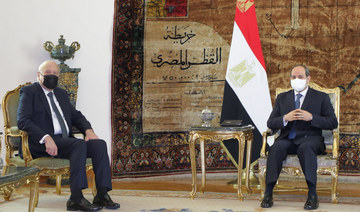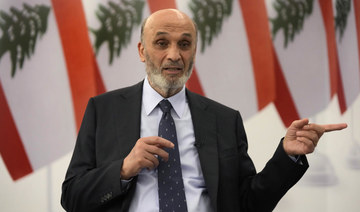TRIPOLI, Lebanon: Ziad Hilweh knew his family might die on the way. But the risk was worth it, he said, to reach the shores of Europe for a new start with his wife and three kids, away from the daily humiliation of life in Lebanon.
The country’s economic meltdown had destroyed him. The currency crash meant that the value of his salary from working at a private security company fell from $650 a month to about $50 after the Lebanese pound lost more than 90 percent of its value in less than two years. It reached the point the 22-year-old could no longer afford milk and diapers for his children.
But the young father’s hopes of a better future were shattered last month, when the boat they were on board headed to Italy broke down in the Mediterranean Sea, hours after they set off from the outskirts of Lebanon’s port city of Tripoli. Along with dozens of other would-be migrants on the boat, they were towed back to shore by the navy after a terrifying attempt at escaping.
For years, Lebanon has been a host for refugees, mainly from Syria, but now it is a departure point. Hundreds of Lebanese have tried to reach Europe this year on boats from their country’s shores, spurred by a devastating economic crisis that has thrown two thirds of the population into poverty since October 2019.
It is not a route on the scale of the main sea path from Turkey to Greece used by many refugees and migrants. But it is a startling shift as Lebanese join Iraqis, Afghans, Sudanese and other Middle Eastern nationalities in leaving their homelands.
Sea departures from Lebanon have increased starting in 2020, compared to previous years, said Lisa Abou Khaled, spokeswoman for the UN refugee agency. According to UNHCR figures, more than 1,570 people embarked or attempted to embark from Lebanon between January and November, most heading for Cyprus. The majority have been Syrians, but Abou Khaled said a notable number of Lebanese have joined them.
“It is evident that these are desperate journeys undertaken by people who see no way of survival in Lebanon,” said Abou Khaled.
The country is witnessing a frightening convergence of multiple crises, including political instability, the coronavirus pandemic and a massive explosion at the capital’s main port in August last year that have all added to the financial unraveling of the country.
Hilweh had been growing more desperate with each day. For months, he asked relatives and friends to help him financially. Chatting with friends one night, he heard that smugglers were taking people to Europe, and that some have already made it there.
He and a close friend, Bilal Moussa, decided to give it a try. Hilweh decided to take his wife and children, while Moussa planned to go alone and apply for family reunification once he settles in Europe.
They were told it would cost $4,000 for each adult and $2,000 for a child. Hilweh sold his apartment and his car and borrowed some from relatives. He was still short, but the smuggler gave him a discount and took the $10,000 Hilweh had, instead of $14,000.
“I am dead here and might die on the way. But if I reach the destination, I can live a decent life,” Moussa said.
The smuggler told them to meet at a location near Tripoli’s Abu Ali river shortly before midnight on Friday, Nov. 19, and that 70 people would be on the boat. At the location, they were put into a covered produce truck and driven to Qalamoun, just south of Tripoli.
There, at an abandoned resort, they boarded the wooden boat with their belongings. Around midnight, as they left shore, the smuggler began reading the names of people on board.
There were 92, instead of 70, including about two dozen Syrian and Palestinian refugees.
They quickly ran into trouble. A Lebanese navy ship approached the boat, ordering them through loudspeakers to turn back. The captain ignored their calls and kept moving west.
The navy ship circled them, causing waves that shook the boat and threw water inside. The shaking grew more violent as the ship drew closer, filling it with more water that pushed it down. The screaming passengers spread out around the boat to balance it and threw bags into the sea to keep it afloat.
Hilweh’s wife and children were sitting near the engine, and when the boat flooded with water, thick smoke poured out. His 3-month-old son Karim stopped breathing and almost suffocated, he said.
“He lived and died in front of me,” he said, recalling the panic before Karim was breathing again.
“I started reciting the shahada,” said Hilweh’s wife, Alaa Khodor, 22, referring to the profession of faith in Islam that Muslims recite when close to death.
Eventually, the boat stabilized, and they kept moving west while the navy chased them. Looking at a screen, the boat’s captain shouted that they had left Lebanon’s territorial waters. Immediately, the navy ship turned back.
“I felt very happy. I am out of Lebanon. I have crossed the line of humiliation,” Hilweh recounted. He celebrated by hugging his wife and two daughters, Rana, 3, and Jana, 2.
Their relief was short-lived. Shortly before sunrise, the water-logged engine gave out completely. Stalled in the darkness and silence, the frightened passengers frantically called relatives in Lebanon to tell the military they needed help.
Hours later, the Lebanese navy finally arrived and towed the boat back.
“Once the boat stopped, I felt everything go dark, I felt devastated,” Hilweh said. “When we arrived back I had tears in my eyes.”
Back in Tripoli, the men were separated from the women and children and questioned for hours. The smuggler is still in detention, Hilweh said.
Tripoli is Lebanon’s most impoverished city. Its mayor, Riad Yamak, said that last year, several people drowned off the coast of Tripoli while trying to reach Europe.
Last year, a boat taking migrants to Cyprus ran out of diesel and was stranded for eight days, during which at least six persons died. The UN peacekeeping forces in Lebanon, known as UNIFIL, rescued the rest and handed them over to Lebanese authorities after giving them first aid.
“This is suicide when someone takes his family by sea,” Yamak said.
Hilweh and his wife disagree. They have already lost their apartment, their car and Hilweh’s job. They said they will keep trying until they make it to Europe even if this means putting their lives and those of their kids in danger again.
“I will take any danger to get out of here. There is nothing here,” Khodor said.
‘I am dead here’: Lebanese join Mideast migrants to Europe
https://arab.news/9j8k4
‘I am dead here’: Lebanese join Mideast migrants to Europe
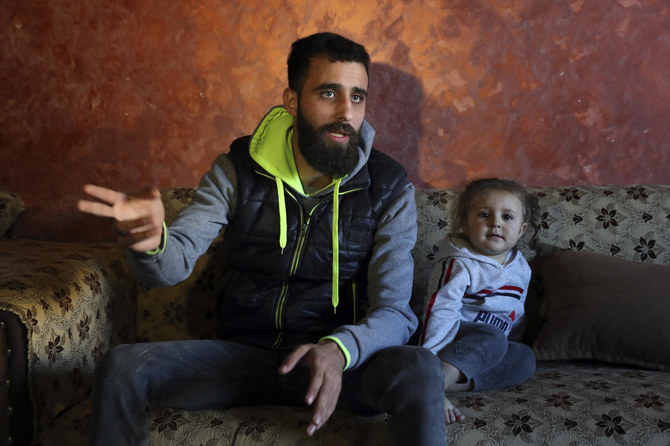
- For years, Lebanon has been a host for refugees, mainly from Syria, but now it is a departure point
Aid groups issue urgent appeal for Yemen funds
- UN agencies warned that 18.2 million people in need of help after nine years of war
A joint statement from 188 humanitarian organizations, including several UN agencies, warned that 18.2 million people — more than half the population — were in need of help after nine years of war.
Their appeal came a day before a meeting of high-ranking EU officials in Brussels to discuss the aid program for Yemen, which is suffering one of the world’s worst humanitarian crises.
“Inaction would have catastrophic consequences for the lives of Yemeni women, children and men,” the statement said, calling Tuesday’s meeting a “critical moment.”
“The humanitarian community appeals to donors to urgently address existing funding gaps, and provide sustainable support to enhance resilience and reduce aid dependency.”
Yemen has been gripped by conflict since the Iran-backed Houthis overran the capital Sanaa in 2014, triggering the Saudi-led military intervention in support of the government the following year.
Hundreds of thousands have died in the fighting or from indirect causes such as a lack of food, the United Nations says.
Hostilities slowed considerably in April 2022, when a six-month, UN-brokered ceasefire came into effect, and they have remained at a low level since.
But only $435 million of the $2.7 billion called for in Yemen’s 2024 Humanitarian Response Plan requirement has been raised, the aid groups said, warning of threats including food insecurity, cholera and unexploded ordnance.
“Underfunding poses a challenge to the continuity of humanitarian programming, causing delays, reductions and suspensions of lifesaving assistance programs,” it said.
“These challenges directly affect the lives of millions who depend on humanitarian assistance and protection services for survival.”
UN atomic watchdog chief due in Iran as concern grows over nuclear activity
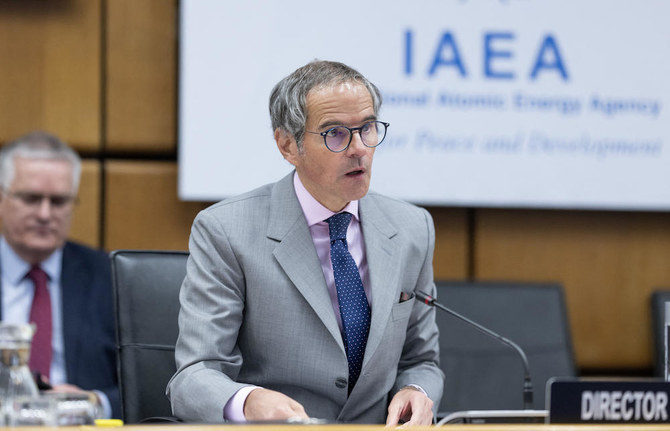
- Visit comes at a time of heightened regional tensions and with IAEA criticizing Iran for lack of cooperation on inspections and other outstanding issues
TEHRAN: UN atomic watchdog chief Rafael Grossi is set to arrive in Iran on Monday, where he is expected to speak at a conference and meet officials for talks on Tehran’s nuclear program.
The visit comes at a time of heightened regional tensions and with the International Atomic Energy Agency (IAEA) criticizing Iran for lack of cooperation on inspections and other outstanding issues.
Grossi, head of the IAEA, is expected to deliver a speech at Iran’s first International Conference on Nuclear Science and Technology.
The three-day event, which starts on Monday, is being held in Isfahan province, home to the Natanz uranium enrichment plant and where strikes attributed to Israel hit last month.
The IAEA and Iranian officials reported “no damage” to nuclear facilities after the reported attack on Isfahan, widely seen as Israel’s response to Iran’s first-ever direct attack on its arch foe days earlier, which itself was a retaliation for a deadly strike on Tehran’s Damascus consulate.
During his visit, Grossi is expected to meet with Iranian officials including the Islamic republic’s nuclear chief Mohammad Eslami.
On Wednesday Eslami, head of the Atomic Energy Organization of Iran, said he was “sure that these negotiations will further help clear ambiguities, and we will be able to strengthen our relations with the agency.”
Iran in recent years has deactivated IAEA monitoring devices at nuclear facilities and barred inspectors, according to the UN agency.
Grossi last visited Iran in March 2023 and met with top officials including President Ebrahim Raisi.
Iran has suspended its compliance with caps on nuclear activities set by a landmark 2015 deal with major powers after the United States in 2018 unilaterally withdrew from the agreement and reimposed sweeping sanctions.
Tensions between Iran and the IAEA have repeatedly flared since the deal fell apart, while EU-mediated efforts have so far failed both to bring Washington back on board and to get Tehran to again comply with the terms of the accord.
Last year, Iran slowed down the pace of its uranium enrichment, which was seen as a goodwill gesture while informal talks began with the United States.
But the Vienna-based UN nuclear agency said Iran accelerated the production of 60-percent enriched uranium in late 2023.
Enrichment levels of around 90 percent are required for military use.
Tehran has consistently denied any ambition to develop nuclear weapons, insisting that its atomic activities were entirely peaceful.
In February, the IAEA said in a confidential report seen by AFP that Iran’s estimated stockpile of enriched uranium had reached 27 times the limit set out in the 2015 accord.
On Sunday, the Iranian official news agency IRNA said Grossi’s visit provides “an opportunity for the two sides to share their concerns,” especially with regard to the IAEA’s inspectors.
Iran in September withdrew the accreditation of several inspectors, a move described at the time by the UN agency as “extreme and unjustified.”
Tehran, however, said its decision was a consequence of “political abuses” by the United States, France, Germany and Britain.
Eslami said the IAEA has “more than 130 inspectors” working in Iran, insisting Tehran remains committed to cooperating with the nuclear watchdog.
Lebanon’s Hezbollah says fired dozens of rockets at Israeli base

- The Israeli army said its warplanes “struck a Hezbollah military structure... deep inside Lebanon,”
The Iran-backed Hezbollah group said it fired “dozens of Katyusha rockets” at an Israeli base in the occupied Golan Heights on Monday in retaliation for a strike in Lebanon’s east.
Earlier, Lebanese official media said three people had been wounded in an Israeli strike early Monday in the country’s east, with the Israeli army saying it had struck a Hezbollah “military compound.”
Hezbollah fighters launched “dozens of Katyusha rockets” targeting “the headquarters of the Golan Division... at Nafah base,” the group said in a statement, saying it was “in response to the enemy’s attack targeting the Bekaa region.”
Israel and Lebanon’s Hezbollah have exchanged regular cross-border fire since Palestinian militant group Hamas’s unprecedented October 7 attack on southern Israel sparked war in the Gaza Strip.
In recent weeks Hamas-ally Hezbollah has stepped up its attacks on northern Israel, and the Israeli military has struck deeper into Lebanese territory.
“Enemy warplanes launched a strike at around 1:30 am this morning on a factory in Sifri, wounding three civilians and destroying the building,” Lebanon’s official National News Agency said.
Sifri is located in Lebanon’s Bekaa Valley, near the city of Baalbek, around 80 kilometers from the Israel-Lebanon frontier.
The Israeli army said its warplanes “struck a Hezbollah military structure... deep inside Lebanon,” referring to the location as “Safri.”
Last month, a building in Sifri was targeted in an Israeli raid, according to a source close to Hezbollah, while the Israeli army said it had targeted Hezbollah sites in Lebanon’s east.
East Lebanon’s Baalbek area is a Hezbollah stronghold and has been repeatedly struck by Israel in recent weeks.
On Sunday official media in Lebanon said an Israeli strike on a southern village killed four family members, with Hezbollah announcing retaliatory fire by dozens of rockets toward Kiryat Shmona in northern Israel.
The intensifying exchanges have stoked fears of all-out conflict between Israel and Hezbollah, which went to war in 2006.
In Lebanon, at least 390 people have been killed in nearly seven months of cross-border violence, mostly militants but also more than 70 civilians, according to an AFP tally.
Israel says 11 soldiers and nine civilians have been killed on its side of the border.
Tens of thousands of people have been displaced on both sides.
Israel attacks Rafah after Hamas claims responsibility for deadly rocket attack
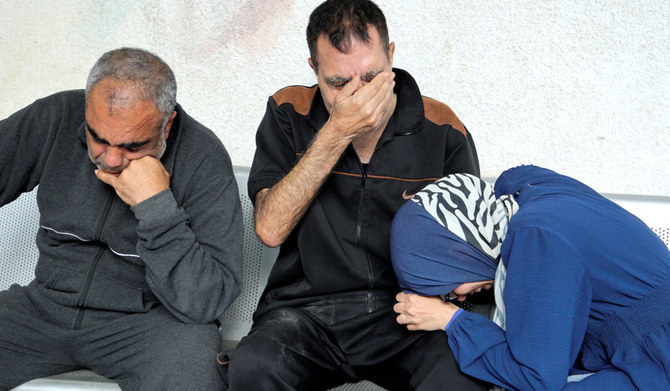
- Hamas claims attack on Kerem Shalom crossing into Gaza that Israel says killed three soldiers
- Sunday's attack on the crossing came as hopes dimmed for ceasefire talks underway in Cairo
CAIRO: Three Israeli soldiers were killed in a rocket attack claimed by Hamas armed wing, near the southern Gaza Strip city of Rafah, where Palestinian health officials said at least 19 people were killed by Israeli fire on Sunday.
Hamas's armed wing claimed responsibility on Sunday for an attack on the Kerem Shalom crossing into Gaza that Israel said killed three of its soldiers.
Israel's military said 10 projectiles were launched from Rafah in southern Gaza towards the area of the crossing, which it said was now closed to aid trucks going into the coastal enclave. Other crossings remained open.
Hamas' armed wing said it fired rockets at an Israeli army base by the crossing, but did not confirm where it fired them from. Hamas media quoted a source close to the group as saying the commercial crossing was not the target.
More than a million Palestinians are sheltering in Rafah, near the border with Egypt.
Shortly after the Hamas attack, an Israeli airstrike hit a house in Rafah killing three people and wounding several others, Palestinian medics said.
The Israeli military confirmed the counter-strike, saying it struck the launcher from which the Hamas projectiles were fired, as well as a nearby "military structure".
"The launches carried out by Hamas adjacent to the Rafah Crossing ... are a clear example of the terrorist organisation's systematic exploitation of humanitarian facilities and spaces, and their continued use of the Gazan civilian population as human shields," it said.
Hamas denies it uses civilians as human shields.
Just before midnight, an Israeli air strike killed nine Palestinians, including a baby, in another house in Rafah, Gaza health officials said. They said the new strike increased the death toll on Sunday to at least 19 people.
Israel has vowed to enter the southern Gaza city and flush out Hamas forces there, but has faced mounting pressure to hold fire as the operation could derail fragile humanitarian efforts in Gaza and endanger many more lives.
Sunday's attack on the crossing came as hopes dimmed for ceasefire talks under way in Cairo.
The war began after Hamas stunned Israel with a cross-border raid on Oct. 7 in which 1,200 people were killed and 252 hostages taken, according to Israeli tallies.
More than 34,600 Palestinians have been killed, 29 of them in the past 24 hours, and more than 77,000 have been wounded in Israel's assault, according to Gaza's health ministry.
Israel begins evacuating part of Rafah, Hamas decries ‘dangerous escalation’

- Witnesses say the areas in and around Rafah to which Israel wants to move people are already crowded and there is almost no room for more tents to be added
RAFAH, Gaza Strip: Israel told Palestinians to evacuate parts of Rafah on Monday in what appeared to be preparation for a long-threatened assault on Hamas holdouts in the southern Gaza Strip city where more than a million war-displaced people have been sheltering.
Instructed by Arabic text messages, telephone calls, and flyers to move to what the Israeli military called an “expanded humanitarian zone” 20km away, some Palestinian families lumbered out under chilly spring rain, witnesses said.
A senior official of Hamas, the militant Palestinian group that governs Gaza, said the evacuation order was a “dangerous escalation that will have consequences.”
“The US administration, alongside the occupation, bears responsibility for this terrorism,” the official, Sami Abu Zuhri, said, referring to Israel’s alliance with Washington.
Israel’s military said it had begun encouraging residents of Rafah to evacuate in a “limited scope” operation. It gave no specific reasons, nor did it say if any offensive action might follow.
“It has been raining heavily and we don’t know where to go. I have been worried that this day may come, I have now to see where I can take my family,” one refugee in Rafah, Abu Raed, said via a chat app.
Witnesses said the areas in and around Rafah to which Israel wants to move people are already crowded and there is almost no room for more tents to be added.
An Israeli offensive in Rafah “would be devastating for 1.4 million people” sheltering there, the UN agency for Palestinian refugees, UNRWA, said on X, adding it would keep a presence in Rafah as long as possible to provide aid.
Seven months into its war against Hamas, Israel has been threatening to launch incursions in Rafah, which it says harbors thousands of Hamas fighters and potentially dozens of hostages. Victory is impossible without taking Rafah, it says.
The prospect of a high-casualty operation worries Western powers and neighboring Egypt, which is trying to mediate a new round of truce talks between Israel and Hamas under which the Palestinian Islamist group might free some hostages.
RIFT
The Rafah plan has opened an unusually public rift between Israel and Washington. Speaking to his UScounterpart, Israeli Defense Minister Yoav Gallant linked Monday’s operation to the deadlock in indirect diplomacy, which he blamed on Hamas.
“During their discussion, Gallant discussed the efforts undertaken to achieve the release of hostages and indicated that at this stage, Hamas refuses the frameworks at hand,” the Israeli Defense Ministry said in a statement.
“Gallant emphasized that military action is required, including in the area of Rafah, at the lack of an alternative,” it added
An Israeli broadcaster, Army Radio, said evacuations were focused on a few peripheral districts of Rafah, from which evacuees would be directed to tent cities in nearby Khan Younis and Al Muwassi.
Many residents in Rafah said they had received telephone calls to evacuate their homes in the targeted area, in line with the army announcement.
In an overnight aerial attack on Rafah, Israeli planes hit 10 houses, killing 20 people and wounding several, medical officials said.
Three Israeli soldiers were killed on Sunday in a Hamas rocket attack near Rafah, at the Kerem Shalom crossing into Gaza, while Palestinian health officials said at least 19 people were killed by Israeli fire.
Sunday’s crossing attack came as hopes dimmed for ceasefire talks in Cairo, with Hamas reiterating its demand for an end to the war in exchange for the freeing of hostages, and Israeli Prime Minister Benjamin Netanyahu flatly ruling that out.
“Our just war in Gaza continues with the exact same goals: the release of all hostages and the defeat of Hamas,” Israeli Foreign Minister Israel Katz said on Monday on X, blaming the Palestinian group for the lack of progress in the Cairo talks.
The war began after Hamas stunned Israel with a cross-border raid on Oct. 7 in which 1,200 people were killed and 252 hostages taken, according to Israeli tallies.
More than 34,600 Palestinians have been killed, 29 of them in the past 24 hours, and more than 77,000 have been wounded in Israel’s assault, according to Gaza’s health ministry.
On Sunday, a top UN official accused Israel of continuing to deny the United Nations humanitarian access in the Gaza Strip, where the UN food chief warned a “full-blown famine” has taken hold in the north of the enclave of 2.3 million people.
While not a formal declaration, World Food Programme Executive Director Cindy McCain said, in an NBC News interview broadcast on Sunday, that based on the “horror” on the ground: “There is famine, full-blown famine, in the north, and it’s moving its way south.”




